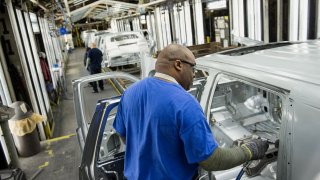
- General Motors plans to invest more than $500 million in a plant in Texas to prepare the facility for production of its highly profitable next-generation large SUVs.
- The Detroit automaker said the investment will include new tooling and equipment in Arlington Assembly's stamping, body shop and general assembly areas.
- The notably profitable SUVs remain in high demand, and sales are needed to assist in funding the automaker's investments in EVs.
DETROIT – General Motors plans to invest more than $500 million in a plant in Texas to prepare the facility for production of its highly profitable next-generation large SUVs.
The Detroit automaker said Thursday the investment will include new tooling and equipment in Arlington Assembly's stamping, body shop and general assembly areas for the gas- and diesel-powered Cadillac Escalade, Chevrolet Tahoe/Suburban and GMC Yukon/Yukon XL SUVs.
The investment is further confirmation that the company plans to continue to spend on its traditional operations to assist in funding its emerging electric vehicle business.
We've got the news you need to know to start your day. Sign up for the First & 4Most morning newsletter — delivered to your inbox daily. >Sign up here.
GM on Monday made a similar announcement for its next-generation heavy-duty pickups, which share the frame of the large SUVS. The truck investment included more than $1 billion in two Michigan plants for production of next-generation heavy-duty trucks.
The notably profitable vehicles remain in high demand, and sales are needed to assist in funding the automaker's investments in EVs. The company has said it plans to exclusively offer consumer EVs by 2035. The automaker recently confirmed an all-electric version of its Cadillac Escalade but declined to disclose when the vehicle will come to market.
Sales of the full-size SUVs totaled more than 279,000 vehicles last year, representing about 12% of the automaker's sales and a notable amount of its profits.
Money Report
The investment announcements come ahead of contract negotiations between the Detroit automakers, including GM, and the United Auto Workers union this summer.
For investors, UAW negotiations are typically a short-term headwind every four years that result in higher costs. But this year's negotiations are expected to be among the most contentious and important in recent memory, fueled by a years-long organized labor movement across the country, a pro-union president and an industry in transition to all-electric vehicles.






